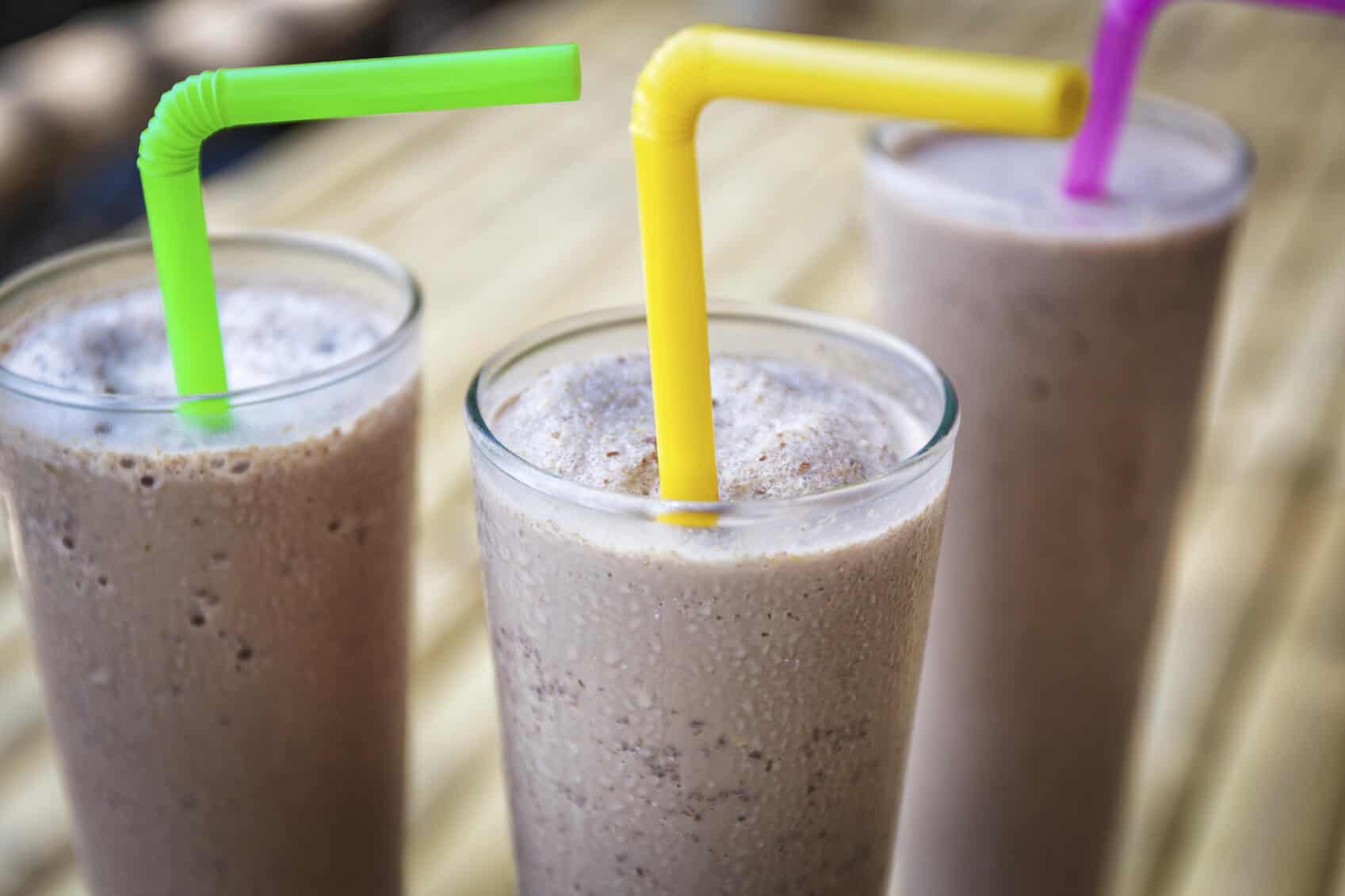Protein shakes provide essential nutrients to your body.
When you consume sufficient amounts of protein, metabolism improves and you’ll feel fuller, longer.
One way you can easily add extra protein to your diet is by drinking protein shakes; a proven means to promote weight loss.
What are Protein Shakes?
In its most basic form, a protein shake is simply protein powder mixed with water, but you can also add other ingredients.
One great thing about protein shakes is that they are easy to make and convenient to add to your diet, which is especially important if you don’t have regular access to other high-protein foods that are of high quality.
While you may not need protein shakes to reach your body’s daily protein requirements, they can be helpful for individuals who have a reason for increasing the amount of protein they consume, such as a medical condition.
There are both powdered protein options and ready-made liquid protein shakes on the market.
Protein powder comes in several varieties. Here are the most popular:
- Brown Rice Protein: Rice powder is plant based and a good option for people who need to avoid protein powders that contain dairy. Rice powder is also easy to digest and hypoallergenic, according to Shape.com and Dr Axe.
- Soy Protein: Soy protein is plant-based and contains soy isoflavones, which studies in The Journal of Perinatal Education and Alternative Therapies in Health and Medicine have shown to have some health benefits. Soy protein contains essential amino acids your body needs.
- Whey Protein: Whey protein is derived from dairy products. According to Medical News Today, it contains nine essential amino acids, so it is considered a complete protein.
- Casein Protein: Casein protein is dairy-based and absorbs more slowly than whey protein (see the study in Proceedings of the National Academy of Sciences of the United States of America).
- Pea Protein: Pea-protein is plant-based and contains essential amino acids that help support a healthy digestive system, states Prevention.
- Hemp Protein: According to Men’s Health, hemp protein is plant-based and contains magnesium, which is a necessary nutrient. Hemp protein is also a good option for people who are lactose intolerant.
Depending on the brand of protein powder you buy, you may find a blend of different types of protein; manufacturers sometimes do this because the proteins contain amino acids that complement one another.
Takeaway: Protein shakes can be purchased ready-made or mixed at home using protein powders. There are several different protein powders available so that you can choose the one that is best for you.
Too little protein and you feel hungry between meals. Too much and the extra protein is transformed into carbs and stored for later use as fat. Know just how much protein you’re eating with a weight-loss app like Noom.
How Many Protein Shakes Should I Drink?
At most, your body can only use 0.8 grams of protein per kilogram of body weight per day, as per WebMD; so it isn’t necessary to add an enormous amount of protein to your diet. Adding one protein shake per day is probably a good start.
Some experts recommend replacing breakfast with a protein shake to reduce calorie intake and boost your metabolism, states DoctorOz.com.
There are all kinds of different recipes for protein shakes. People often add ice and fruit to make a refreshing, delicious drink.
Drinking protein shakes made with whey may cause some uncomfortable gastrointestinal side effects if you are lactose intolerant. However, if that’s the case, switching to a plant-based protein should alleviate the problem.
Are There Side Effects to Protein Shakes?
Research has never proven that high protein diets are of any risk to the kidneys of healthy people. But, in those who have kidney problems, a low protein diet can be better (see the study in Nutrition & Metabolism).
Protein is necessary for good bone health. Studies in The American Journal of Clinical Nutrition and The Journal of the American College of Nutrition have shown that, contrary to the old belief, high-protein diets result in fewer fractures and greater bone mass.
One study showed that doubling your protein intake leads to a loss of fat.
The study divided people into three groups: One group tripled their protein, one doubled their protein, and one ate the recommended dietary allowance (RDA) of protein.
The results of the study showed that the group that doubled their protein lost the most fat while the group that ate the recommended amount of protein lost the least, Women’s Health reports.
According to Harvard Health, you can determine your RDA of protein by multiplying your body weight in pounds by 0.36. The resulting number is the RDA of protein in grams.
Takeaway: Adding one protein shake per day to your diet can help you lose fat without harming your kidneys or bones. If you’re lactose intolerant, be sure to choose a plant-based protein to avoid gastrointestinal problems.
Do you want to know the nutritional value of the plant-based protein shake you’re consuming? Or maybe you want to know what vitamins whey protein offers. Either way, the Noom app can help you find out everything you want to know about the foods, and protein shakes, you eat.
Will Protein Shakes Boost My Metabolism?
Increasing your protein consumption may rev up your metabolism, which can help you burn some extra calories daily, stated DoctorOz.com and The American Journal of Clinical Nutrition.
According to WebMD, your body has to burn more calories so it can digest protein than it does to digest carbs or fat, which can lead to weight loss.
This temporary increase in metabolism is called the thermic effect of food, or TEF. The TEF for protein is higher than that of fat or carbs (see studies in Nutrition & Metabolism and The American Journal of Clinical Nutrition).
Eating more protein can help you to build muscle, especially if you participate in strength training, suggests research in the International Journal of Sports Nutrition and Exercise Metabolism.
When you add muscle mass to your body, your body burns more calories even when you’re resting because muscle burns more calories than fat, says WebMD.
One study in Clinical Nutrition involving obese participants showed that those who consumed protein shakes with 200 grams of extra protein per week gained 2.8 more pounds of muscle mass than those who drank shakes with no added protein.
Takeaway: Adding protein shakes to your diet can help your body to burn more calories for two reasons: 1) Protein takes more calories to digest; 2) Protein helps build muscle and muscle burn more calories than fat.
Can Protein Shakes Help You Lose Belly Fat and Weight?
Diets high in protein have been shown to promote fat loss, especially belly fat (see the study in The American Journal of Clinical Nutrition).
One study divided 40 men into two groups. Both consumed low-calorie diets, but one group received more protein than the other.
The results of the study showed that the higher protein group lost more fat, with an overall weight loss of 10.5 pounds, which was about 2.5 more than the low-protein group, ScienceDaily reports.
Another study in Physiology & Behavior looked at various diets and compared their results. The participants who ate more protein lost around 31 pounds in 3 months, which was about 23% more weight than those following other diet plans.
As reported by Prevention, a separate study divided 30 overweight people into two groups. Both ate the same number of calories per day.
One ate a diet centered on carbs, with only 15% of the calories coming from protein. The other ate a diet that consisted of 35% protein, including protein shakes made with whey protein.
At the end of the study, the group eating more protein lost between 5 and 7 pounds while the other group lost only 1 or 2. What’s more, the higher protein group shed mostly fat, especially in the belly.
Takeaway: Increasing the protein in your diet by drinking protein shakes can help you lose weight, especially fat that collects around the belly.
Not all protein shakes are created the same. Track the protein shakes you drink and the foods you eat with Noom and your daily nutritional values are available for the entire day, not just one meal.
Will Protein Shakes Help Me Feel Less Hungry?
Researchers have shown that protein helps manage appetite by altering hormone levels that affect appetite. It can also help you feel fuller for a more extended period (see research from The American Journal of Clinical Nutrition and Cell Metabolism).
In one study, men who had protein at breakfast ate an average of 112 fewer calories at a buffet luncheon and 400 less in the subsequent 24-hour period, Medical News Today reports.
Since eating protein will help you feel more full, you’ll automatically find yourself reaching for snacks less often, helping you to eat fewer calories throughout the day, MNT adds.
In fact, one study in Obesity of overweight men showed that those who upped their protein intake to 25% of their daily calories reduced their cravings by up to 60% and cut late-night snack consumption in half.
Another study in Appetite of athletes who were participating in resistance training showed that when they drank protein shakes containing whey protein, they rated their hunger at 50%-65% lower than without the protein shakes.
Takeaway: Protein shakes can help you feel less hungry so that you reach for snacks less often and eat less at regular meals.
Can Protein Shakes Help Me Maintain Weight Loss?
If you’ve already been successful at losing weight, adding protein shakes to your diet could help you keep it off.
One study in Physiology & Behavior concluded that people on high-protein diets were able to lose more weight than those on low-carb or low-fat diets. They were also more successful at maintaining weight loss.
Those who ate high-protein diets only gained back about 9% of the weight lost while those on lower protein diets gained back 23%.
Another study looked at the effects of five different diets on weight loss and maintenance over six months. Two of the diets were high-protein diets, and they were the diets most successful for preventing weight gain.
Those participants on the high-protein diets regained less than two pounds while participants on the other three diets regained between four and six pounds, CTVNews.ca reports.
In another study in the British Journal of Nutrition, participants took 30 grams of a protein supplement, which lead to a reduction in waist size and regained less weight than the control group.
This indicates that it isn’t necessary to consume large amounts of protein to promote weight loss. And, since you want to avoid adding excess calories, one protein shake per day should be sufficient to help you meet your weight-loss and maintenance goals.
Takeaway: Protein shakes can help you avoid regaining the weight you’ve already lost. Just be sure not to add extra calories to your overall caloric intake for the day.
Weight-loss plateaus can often lead to discouragement – and maybe the end of your weight-loss journey. If you gradually consume less protein, you may be sabotaging your success. With Noom, you track the foods and drinks throughout the day, so you know your protein levels are solid.
Can Protein Shakes Help Boost Metabolism and Build Muscle?
A lot of diets aimed at losing weight can cause muscle loss. Since we already know that muscle burns more calories than fat, thus boosting your metabolism, losing muscle can make it easier for your body to regain weight when you stop following the diet.
The good news is that if you continue with consuming a higher level of protein and participate in strength training, you can prevent muscle loss and keep your metabolism running at a higher rate, suggests one study in the Journal of Nutrition.
A review of 25 studies (see Current Opinion in Clinical Nutrition & Metabolic Care) showed that whey protein increases muscle protein synthesis, which is the process by which the body rebuilds muscle tissue.
There is evidence that higher protein intake can make your body up to 350% more effective at maintaining muscle mass (see Journal of Nutrition).
Takeaway: Increasing your protein intake with protein shakes while you follow a weight-loss diet can help your metabolism run at a higher rate and prevent the loss of muscle mass, especially if you combine your diet with a strength-training program.
What Is the Best Kind of Protein to Use?
As per one study in Nutrition & Metabolism, the body absorbs whey protein faster than casein, so whey helps you fill up faster.
Also, researchers don’t all agree on which type of protein is best for weight loss and muscle maintenance.
In one study in the Journal of Nutrition, whey protein was shown to increase weight loss by about 5 pounds more than soy protein.
However, other studies (see Nutrition Journal and The Journal of Nutrition, Health and Aging) show there is no difference in fat loss between soy, whey, egg, or rice protein.
There are other factors to consider, as well.
If you’re lactose intolerant, you may want to avoid dairy-based proteins like whey.
If you’re following a vegan diet, you’ll want to choose a plant-based protein.
You may also want to pay attention to the essential amino acids that your protein shake provides. However, if you’re also getting protein from other sources, this probably isn’t an issue.
Takeaway: While some studies show that whey is the best source, the evidence isn’t conclusive. Choose the protein powder that works best for you.
All sources of protein are available in Noom‘s extensive food database. Nutritionists manage the database, so you know the nutritional information is accurate and reliable.
What Users Are Saying
“Helps me boost protein without red meat. Pleasant taste.”
“I try to get as much protein in my diet, when I don’t, I just drink this protein shake. I love the taste.”
“I wanted to try a plant based protein powder so I bought this product and regretted it after my first shake. The protein power does not mix, shake or blend well at all. The taste is OK as long as you add a lot of ingredients. If you are thinking of trying a plant based protein, don’t use this one. I honestly will be going back to whey protein.”
“Products containing whey and milk cause bloating and upset stomach for me. I like plant based products because I feel that I’m getting extra vitamins from vegetables/plants which I don’t consume as I should everyday. A multivitamin may help too but I really don’t know how much my body is actually absorbing. Doesn’t hurt to have a variety from different sources.”

The Final Word on Protein Shakes
In general, people don’t have trouble getting enough protein in their diets without protein shakes.
Looking to lose weight? Shakes are an easy and safe (not to mention tasty!) way to get some extra protein.
Protein shakes not only help you lose weight but boost metabolism, maintain muscle mass and help keep the weight off.
Drop Pounds and Belly Fat by Drinking Protein Shakes – Here’s How! Questions & Answers
- Recent:
The best protein shake for belly fat loss is one that contains a low-fat, low-sugar formula with a high quantity of healthy proteins such as whey or egg white. Additionally, look for ingredients like green tea extract and/or caffeine to boost your metabolism. Consider adding natural sweeteners like honey or stevia if you need additional sweetness. Aim to find a protein powder that contains at least 20 grams of protein per serving.

Summer Banks has researched over 5000 weight-loss programs, pills, shakes and diet plans. Previously, she managed 15 supplement brands, worked with professionals in the weight loss industry and completed coursework in nutrition at Stanford University.


